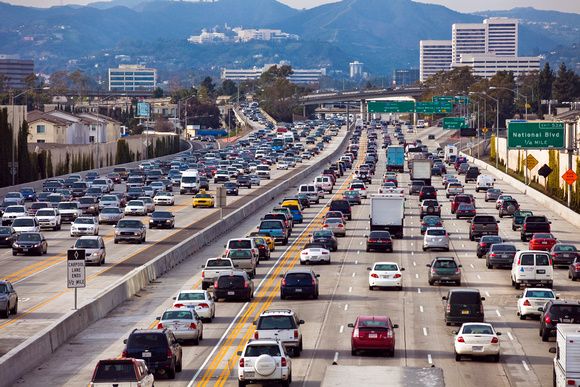Is Caltrans too car-centric?
by Chris Reed | August 31, 2019 5:08 pm

Gov. Gavin Newsom may have to step in to resolve a dispute between a state agency and a high-profile lawmaker over “Complete Streets”[1] – a core concept of modern “smart growth” planners that holds streets should provide safe access and use not just to vehicles but to pedestrians and those using other types of transportation.
Sen. Scott Wiener, D-San Francisco, says Caltrans is trying to sandbag his “Complete Streets” measure, Senate Bill 127[2]. While it doesn’t impose any formal requirements on Caltrans, the bill does require the agency to study adding improvements that accommodate pedestrians, bicyclists and transit when fixing an existing road or building a new one.
The bill has passed the state Senate, the Assembly Transportation Committee and, last week, the Assembly Appropriations Committee on largely party-line votes. It seems likely to reach Newsom’s desk after the full Assembly approves it within the next two weeks.
Caltrans sees proposed rule as very costly
But Wiener was unhappy enough with a Caltrans communication on the expected cost of his measure that he depicted the agency as underhanded in a recent interview[3] with the San Francisco Chronicle.
Caltrans said compliance costs would be so high – $4.5 million per mile of blacktop and more than $1 billion a year – that it would be unable to meet its road improvement obligations that are part of the 2017 law increasing the state’s gasoline tax. The agency also said Wiener’s measure would make it impossible to satisfy the conditions of grants from the Federal Highway Administration.
Wiener wrote two weeks ago to David Kim – secretary of California State Transportation Agency, which oversees Caltrans – that this cost estimate was so “severely inflated” that it “undermines the agency’s credibility.” He said evidence from local governments suggested that SB127’s costs would be from $20,000 to $600,000 per mile, depending on the nature of the project.
Wiener also told the Chronicle that Caltrans appears to think it would be obligated to put up bike lanes on all its projects when in fact the main priority is the “little towns all over California where their main street is a state highway. … That’s where businesses are. That’s where people are walking around. That’s where the school is. Some of them don’t have crosswalks.”
Caltrans an early fan of ‘Complete Streets’
But Caltrans’ history undercuts Wiener’s claim that its high estimates are being driven by outdated views that see roads as being for cars and cars only. Caltrans was one of the first[4] state transportation agencies to embrace “Complete Streets” in 2008. In a 2015 interview[5] with Governing magazine, Malcolm Dougherty – then Caltrans director – touted the agency’s commitment to the concept.
And in 2017, Dougherty used a Caltrans news release to tout the exact sort of “Complete Streets” project – on State Route 62 in Joshua Tree – that Wiener called his priority.
The news release quoted Dougherty as saying the project “used funds from a current construction project to restripe the downtown section of Joshua Tree with bike lanes and diagonal parking in order to more safely move vehicles, pedestrians and bicyclists through the downtown business district … [providing] meaningful improvements that create streets which move all users safely and efficiently along and across the roadway.”
Dougherty resigned his Caltrans post last year. His replacement, Caltrans engineer Laurie Berman, is a strong proponent of “Complete Streets” as well. She told a Streetsblog[6] writer in November that while she had worked at Caltrans, her agency had “gone from being heavily criticized for not knowing anything about ‘Complete Streets’ to establishing a Center of Excellence, and providing tools that we can all use, statewide, to move forward together and build facilities that are useful to everyone.”
Berman reports to Kim.
- “Complete Streets”: https://smartgrowthamerica.org/program/national-complete-streets-coalition/publications/what-are-complete-streets/
- Senate Bill 127: https://leginfo.legislature.ca.gov/faces/home.xhtml
- interview: https://www.sfchronicle.com/bayarea/article/Caltrans-seeks-to-steamroll-bill-to-include-bike-14371988.php
- one of the first: https://dot.ca.gov/programs/transportation-planning/office-of-smart-mobility-climate-change/smart-mobility-active-transportation/complete-streets
- interview: https://www.governing.com/topics/transportation-infrastructure/gov-complete-streets-roads-bikes-pedestrians.html
- Streetsblog: https://cal.streetsblog.org/2018/11/06/new-caltrans-executive-director-laurie-berman-speaks-of-changes-afoot-at-the-state-dot/
Source URL: https://calwatchdog.com/2019/08/31/is-caltrans-too-car-centric/